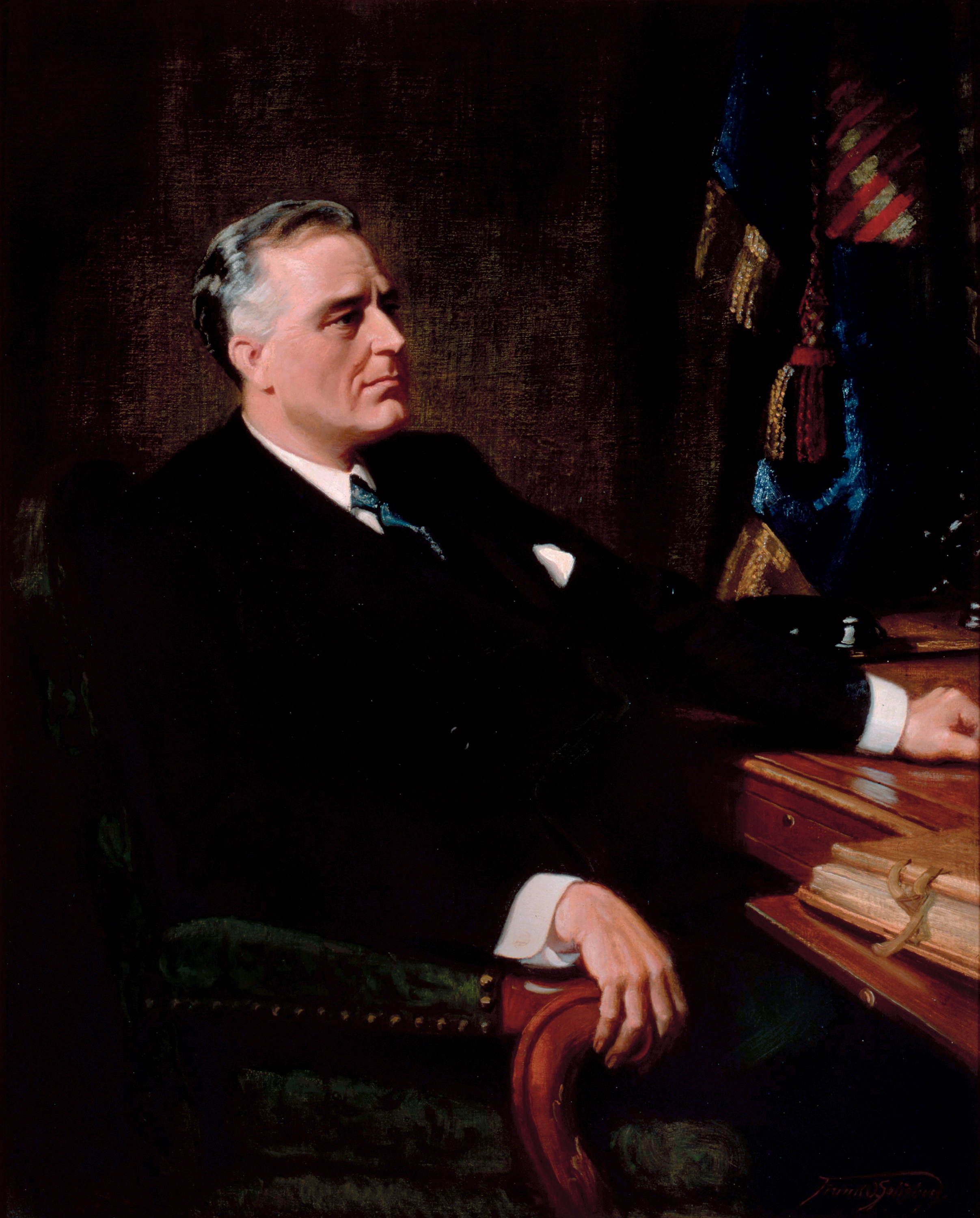Happiness lies not in the mere possession of money; it lies in the joy of achievement, in the thrill of creative effort.
discurso de posse (4 de Março de 1933)
Franklin Delano Roosevelt Frases famosas
Franklin Delano Roosevelt frases e citações
“A única coisa da qual devemos ter medo é do próprio medo.”
only thing we have to fear is fear itself
discurso de posse (4 de Março de 1933)
Variante: A única coisa que devemos temer é o próprio medo.
The Public Papers and Addresses of Franklin D. Roosevelt : The call to battle stations, 1941. - v.10 Página 227, de Franklin Delano Roosevelt, Compilado por Sammuel Irving Rosenman - 1938
It is a good thing to demand liberty for ourselves and for those who agree with us, but it is a better thing and a rarer thing to give liberty to others who do not agree with us
The public papers and addresses of Franklin D. Roosevelt: with a a special introd. and explanatory notes by President Roosevelt: Volume 2 - página 497, Franklin Delano Roosevelt - Random House, 1938
“Somos todos Keynesianos agora.”
We are all Keynesians now
The Fall of the House of Roosevelt: Brokers of Ideas and Power from FDR to LBJ - Página 226, de Michael Janeway - 2004 - 284 páginas; citação muitas vezes atribuídas a Nixon
Em relação ao Welfare State e a crise de 1929, referindo-se ao economista John Maynard Keynes
"A rendezvous with destiny", Elliott Roosevelt e James Brough - Londres, W. H. Allen, 1977
Franklin Delano Roosevelt: Frases em inglês
“Repetition does not transform a lie into a truth.”
Radio address (26 October 1939), as reported in The Baltimore Sun (27 October 1939)
1930s
“Be sincere, be brief, be seated.”
Advice to his son James on how to make a public speech, as quoted in Basic Public Speaking (1963) by Paul L. Soper, p. 12
Posthumous publications
1930s, Speech to the Democratic National Convention (1936)
1930s, Address at Chautauqua, New York (1936)
Reported by Representative Martin Dies as having been said in a conversation at the White House, in the Congressional Record (September 22, 1950), vol. 96, Appendix, p. A6832. Reported as "exceedingly dubious" in Paul F. Boller, Jr., Quotemanship: The Use and Abuse of Quotations for Polemical and Other Purposes, chapter 8, p. 361 (1967); Boller goes on to say that "it is most unlikely that FDR would have said anything like it, even flippantly, to the zealous HUAC chairman, though he may have told Dies that he was exaggerating the size of the American communist movement".
Misattributed
1930s, Address at Madison Square Garden (1936)
Editorial for Macon Telegraph, April 30, 1925
1920s
Franklin Roosevelt's Statement on the National Industrial Recovery Act (16 June 1933) http://docs.fdrlibrary.marist.edu/odnirast.html
1930s
Fonte: [Tritch, Teresa, F.D.R. Makes the Case for the Minimum Wage, http://takingnote.blogs.nytimes.com/2014/03/07/f-d-r-makes-the-case-for-the-minimum-wage/, March 7, 2014, New York Times, March 7, 2014]
“In politics, nothing happens by accident. If it happens you can bet it was planned that way.”
There are no records of Roosevelt having made such a statement, and this is most likely a misquotation of the widely reported comment he made in a speech at the Citadel (23 October 1935):
: Yes, we are on our way back — not just by pure chance, my friends, not just by a turn of the wheel, of the cycle. We are coming back more soundly than ever before because we are planning it that way. Don't let anybody tell you differently.
Misattributed
“Philosophy? I am a Christian and a Democrat. That's all.”
To a reporter who asked him to define this philosophy. Quoted in Alter, Jonathan The Defining Moment: FDR's Hundred Days and the Triumph of Hope https://books.google.com/books?id=ASmlaOHQNawC&pg=PA244&dq=fdr+i+am+a+christian+and+a+democrat&hl=en&sa=X&ved=0ahUKEwjDp7WquOjaAhXqxYMKHTFBDTgQ6AEIUDAH#v=onepage&q=fdr%20i%20am%20a%20christian%20and%20a%20democrat&f=false pg. 244
1930s
Radio Address to the New York Herald Tribune Forum http://www.presidency.ucsb.edu/ws/index.php?pid=15828 (26 October 1939)
1930s
1930s, State of the Union address (1935)
1930s, Speech to the Democratic National Convention (1936)
1930s, Second inaugural address (1937)
1930s, Address at Chautauqua, New York (1936)
1940s, Third inaugural address (1941)
Comment in early 1933 about Benito Mussolini to U.S. Ambassador to Italy Breckinridge Long, as quoted in Three New Deals : Reflections on Roosevelt's America, Mussolini's Italy, and Hitler's Germany, 1933-1939 (2006) by Wolfgang Schivelbusch, p. 31
1930s
1940s, Prayer on D-Day (1944)
Greeting to the American Committee for Protection of Foreign-born (9 January 1940); later inscribed on the Franklin Delano Roosevelt Memorial.
1940s
Speech at the Washington Navy Yard (16 September 1942)
1940s
1940s, Third inaugural address (1941)
1930s, Quarantine Speech (1937)
1940s, State of the Union Address — The Four Freedoms (1941)
1930s, Address at Madison Square Garden (1936)
“If I prove a bad president, I will also likely to prove the last president.”
Remark at the time of his first inauguration as quoted in The 168 days (1938) by Joseph Alsop and Turner Catledge, p. 15
1930s
Statement on Signing the Securities Bill http://www.presidency.ucsb.edu/ws/index.php?pid=14654 (27 May 1933)
1930s
